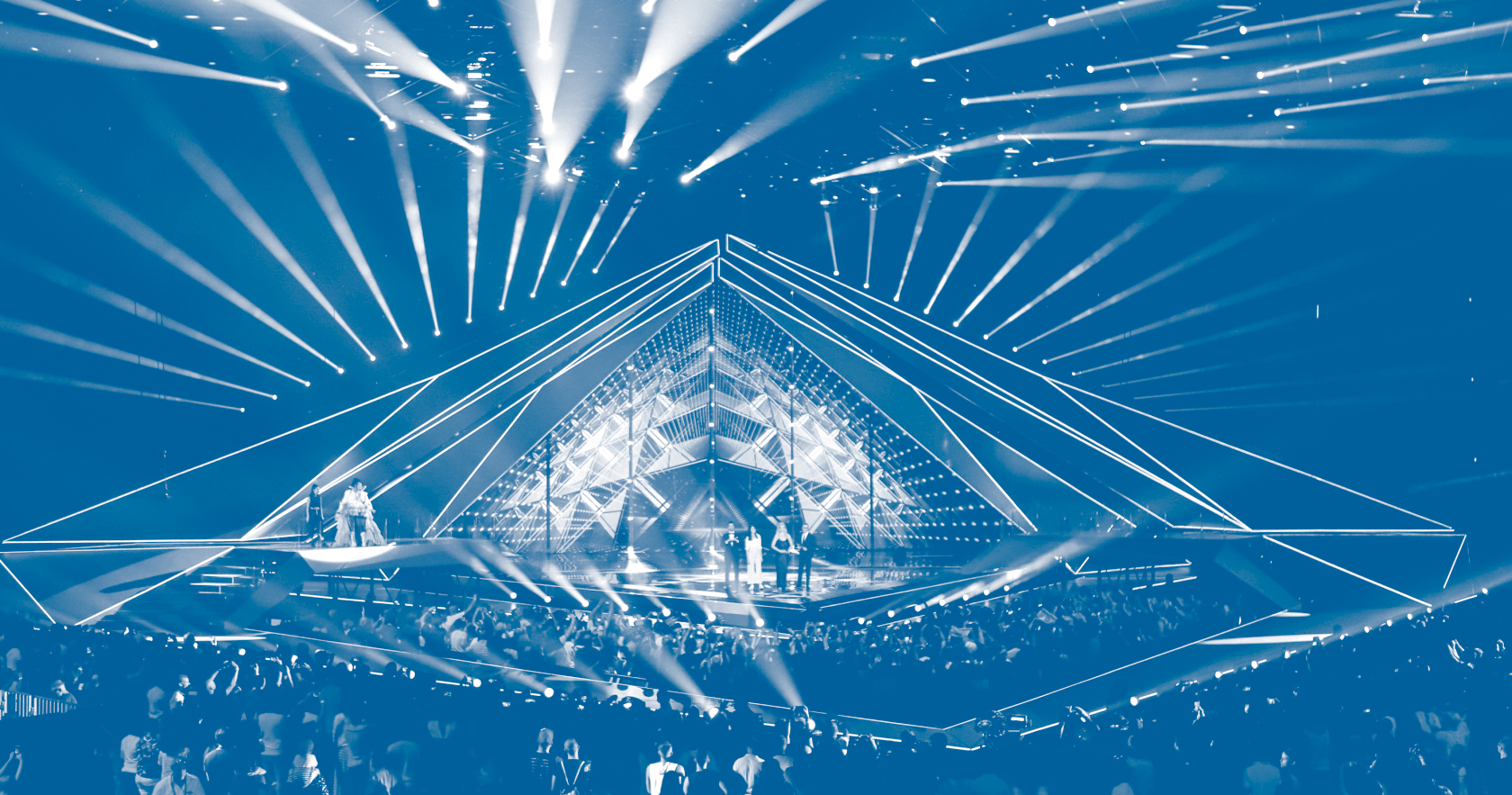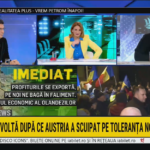By Owen Alterman | Tel Aviv
May 2019 featured three major European events. One didn’t even take place in Europe. The first happened on May 9, Europe Day, when European leaders gathered for their summit in Sibiu, Romania. The second: the set of European Parliament elections across the 28 European Union member states. And the third major European event of May 2019 was the Eurovision song contest, which took place not in a quaint Transylvanian mountain town or across the villages and downtowns of the Continent or British Isles, but in a convention center on the edge of Tel Aviv, Israel. In the city’s beachside park, some 500,000 people packed the largest Eurovision village in the history of the competition.
The night when singer Netta Barzilai won the Eurovision contest in 2018 – giving Israel hosting rights for 2019 – thousands of Israelis spontaneously converged on Tel Aviv’s Rabin Square to celebrate. Two days afterwards, on May 14, 2018, tens of thousands came back again for Netta’s heroic welcome home. The event played as part of a triple split-screen on a momentous – and bizarre – day in Israel’s history. In one box, Jared Kushner and Ivanka Trump celebrated the opening of the U.S. embassy in Jerusalem. In another box, at least 63 Palestinians were killed in violent protests on the Gaza border. And, in the third box, Netta.
That Netta would make the split screen – and compete as an equal with two other mega-headlines – sends a strong signal.
Netta’s win was a triumph for Israel in the country’s love-hate relationship with Europe, and the latest twist in the centuries-long tussle between Athens and Jerusalem.
When Israel won its first major European competition, (the 1977 European basketball championship), Maccabi Tel Aviv forward Tal Brody screamed into the cameras: “We’re on the map, and we’re staying on the map!” The jubilation, marked by Brody’s distinctive Americanaccented Hebrew, has become an iconic moment in Israeli culture, one that many Israelis can recognise instantly.
Craving for Europe
And many Israelis can recognise, instantly, the psychology behind Brody’s comments, what Brody was really saying: A part of the Israeli psyche wants – craves – to be accepted by Europe. To be at a European standard in culture, in sports, in education, in economic achievement. To have the stuff of Europe. In a recent poll conducted by the Konrad Adenauer Stiftung (KAS), some 53% of Israelis said they would want Israel to be part of the European Union.
The craving for Europe – to be worthy of Europe, to be the proud, equal partner of European nations – was part of Zionism from its very beginning.
Theodor Herzl, the founding father of modern Zionism, envisioned a Jewish state in which German would be widely spoken and in which European culture would predominate. Herzl’s intellectual successors inherited the craving for Europe in different ways.
David Ben Gurion, the leading force in left-wing labour Zionism (who would become Israel’s first prime minister), looked to the values of European socialism. Ze’ev Jabotinsky – Ben Gurion’s rival, who founded the movement that would become the Likud party – was himself a European intellectual, comfortable in European salons discussing the mix of liberalism and Jewish nationalism in which he believed.
Yet Israel’s relationship with Europe is not a ‘love’ relationship. It is a ‘love-hate’ relationship. The animosity is there, too, and not in small doses. The KAS poll showing that 53% of Israelis want to be part of the European Union also showed that 54% of Israelis have a negative view of the EU.
A segment of Israelis wants to be part of the EU, but doesn’t like it. To veteran observers of Israel, that strange finding would come as little surprise. Tension with Europe is a constant item in the Israeli press.
A year ago, the tension was about an EU initiative to put special labeling on products made in Israel’s West Bank settlements. More recently, the tension has surrounded Israeli plans to raze the Bedouin village of Khan al-Ahmar in the West Bank (which has EU-funded projects in it). In reality, the tension is about neither: it’s about the feeling shared by many Israelis that a condescending Europe is preaching to the Jews about what they should do.
The ghosts of troubled history
The ghosts of European and Jewish history are awake, all the time. In looking at Europe, many Israelis have a post- colonial mentality, fed by those historical ghosts and then compounded by the wariness in the Jewish tradition toward European civilisation.
Europeans often understand and empathise with the post-colonial mentality in dealings with Africa, India, and the Arab world. But is that post-colonial mentality recognised among Jews?
Save for the few decades of the British Mandate, Europe hasn’t been a colonial power over Jews for almost two thousand years. Yet Jews still feel as if they were colonised by Europe, with the same sense of grievance and historical wrong.
This is not just because of the Holocaust. Even without Hitler, there would be ample material. The massacres of the Crusades and expulsion from Spain are still memorialised year in, year out, in Jewish liturgy as part of a litany of tragedies, since the Romans’ destruction of the Second Temple.
The Jewish religion does not forget: as the tradition notes, he who remembers the destruction of the Temple will deserve to see it rebuilt.
In the meantime, he who remembers the destruction of the Temple remembers what Europe has been. Dealing with a modern Europe threw Judaism into chaos; and the reverberations of that—the fallout from emancipation and persecution—have now become the central question of modern Jewish history. This necessarily affects the practical question of how a modern, sovereign Jewish state should deal with Europe.
Israelis are from Mars, Europeans from Venus
That historical tension is supplemented by two others. One is ideological. Modern political Zionism – the Zionism of Herzl – was born out of nineteenth-century-style liberal European nationalism.
Herzl and other Zionist thinkers imagined a world of liberal, sovereign nation-states cooperating with each other, the Jewish state among them. Zionism has broadly stayed in that place – the model of individual, sovereign nation-states. Post-World War II, however, Europe has largely moved on, even if that consensus is now famously being questioned (about which more below). The general thrust of Yoram Hazony’s controversial The Virtue of Nationalism is powered by these Zionist impulses, even if not all Zionists would vouch for all of Hazony’s specific claims.
Zionism and the EU’s supranationalism are ideologically at odds with each other. They have different models of the geopolitical good life.
Leading Israelis in policy circles often note that Israel has better diplomatic relationships with governments of individual member states than it does with officials at the EU level.
That is no coincidence. Member state governments are incentivised, first and foremost, to look out for individual national interests. EU officials have a different mindset and worldview.
At a basic, ideological level, Zionism and EU supranationalism are hard to reconcile and are an added tension. They are Mars and Venus.
Finally, there is a more surface-level set of differences in policy and values between many European leaders and the elected Israeli governments of the present and recent past. In some ways, these differences are an outgrowth of the other two tensions (historical and ideological). Increasingly, they also have parallels with the clash between the European establishment and illiberal governments in Hungary, Poland, and elsewhere.
There are also differences in assessments of the parties’ incentives and motivations in the Middle East. These flare up around the Israeli-Palestinian conflict and, in the past few years, especially with regard to Iran, where the tension is both the ‘what’ of policy and also, as noted above, the ‘how’: the perception of a condescending Europe disrespecting the Jews. There is tension both about the substance of the policy and also about the style of a Europe that does not bear Israel’s security risks seeming to preach policy— with all the historical demons that awakens.
This set of tensions, too, is important and complicated; at times, this is not only a question of tensions between Europe and Israel, but also within Europe, and within the Jewish world.
Europeans are familiar with the tension within Europe between the liberal and the illiberal; but they may be less familiar with the tension between the Israeli government and some local European Jewish communities.
These are at their sharpest in Hungary, where Benjamin Netanyahu has more or less embraced Viktor Orbán, while the mainstream of the local Jewish community more or less shuns him over charges that Orbán has fanned anti-Semitism, as well as his ‘illiberal democracy’ agenda in general.
Poland is another important case. With Poland and Israel, the present is at war with the past. Should Israel prioritise the present, putting aside the ruling party’s policies on Holocaust history? Or prioritise the past, putting aside practical trade, tourism, and security ties between the countries?
Can alignment on policy mean that history is forgiven and forgotten? Or do the scars of history mean that the more concrete national interest should be sidelined?
In Israel, these questions are fiercely debated – and remain unresolved, driving a wedge through the heart of the Israeli right. The prime minister has signed a deal with Poland on Holocaust memory, accepting many Polish claims, presumably in order to push historical grievance to the side in order to work on joint policy goals in the here and now. And the acting foreign minister, just a few months later, quips on television that Poles suckle anti-Semitism with their mothers’ milk.
Identity split: between Esau and Japheth
Is Europe Esau? In the Jewish tradition, Esau is not only Jacob’s resentful brother. He is a prototype for Rome and the Western Christian civilisation that came after it: the smart, shrewd, powerful civilisation that respects its father (Isaac), but is destined to be Jacob’s eternal foe, any reconciliation always being appended with an asterisk. The tradition says, “The law is well-known. Esau hates Jacob.” And so it will be forevermore. Poles suckle anti-Semitism from their mothers’ milk. Europe is to be kept at arm’s length.
But the Book of Genesis has another, more promising prototype for European-Jewish relations: Japheth, the youngest son of Noah. The Jewish tradition’s attitude toward Japheth is no less chauvinistic than toward Esau, but it is more forgiving. Japheth is the paragon of beauty, aesthetics, the arts; the progenitor and symbol of Greek civilisation.
He is destined not to be the eternal foe of the seed of Jacob, but rather their potential partner. Japheth can, if he chooses, dwell in the tents of Shem (the son of Noah and ancestor of Abraham and the Jewish people).
Japheth can partner with Shem, and together, they can channel their best characteristics toward repairing the world.
There is a potential for reconciliation, even if, in modern times, the metaphor has been turned on its head: not Japheth dwelling in the tents of Shem, but Shem seeking the acceptance that comes from dwelling – culturally, politically, economically – in the tents of Japheth. A Jewish state wanting Europe to accept its policies, to accept it as an equal cultural partner.
And, if acceptance is not forthcoming, then to see Japheth as Esau. An eternal foe.
On that night back in May 2018 when Netta won the Eurovision contest, Europe was Japheth. It was Japheth, too, when Tel Aviv hosted the contest a year later.
But Esau hovers about. Take many of the half a million people who flooded Tel Aviv’s Eurovision village; in another time and place, many would curse Europe.
So for us in Israel, what is Europe? The cultural partner whose acceptance we crave? The Dark Continent, to be treated with history’s resonant suspicion? Or a place with which to do tourist, financial, or diplomatic business in the practical, modern here-and-now?
Europe may be Japheth. It may be Esau. Or it may be a normal civilisation, rescued from the shackles of tradition. Or, somehow, in the vortex of the Israeli mind, it may be all three.
OWEN ALTERMAN is Senior International Affairs Correspondent at i24NEWS, based in Tel Aviv. As part of his work, Owen covers Europe and European politics extensively. Before his current position, Owen was a research fellow at the Institute for National Security Studies in Tel Aviv. Owen holds an A.B. from Princeton and a J.D. from Harvard Law School.





